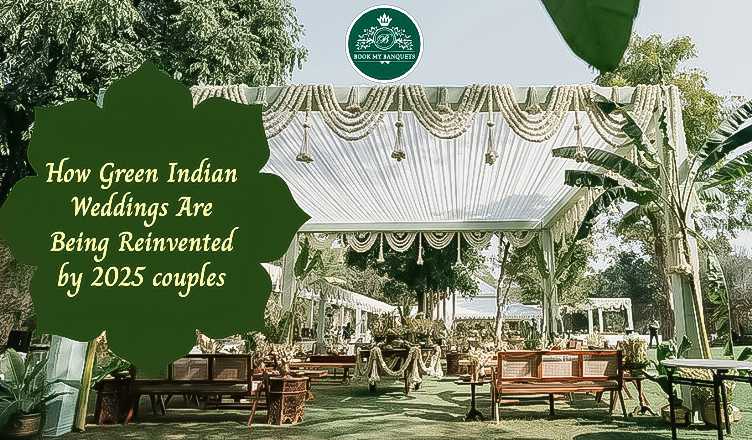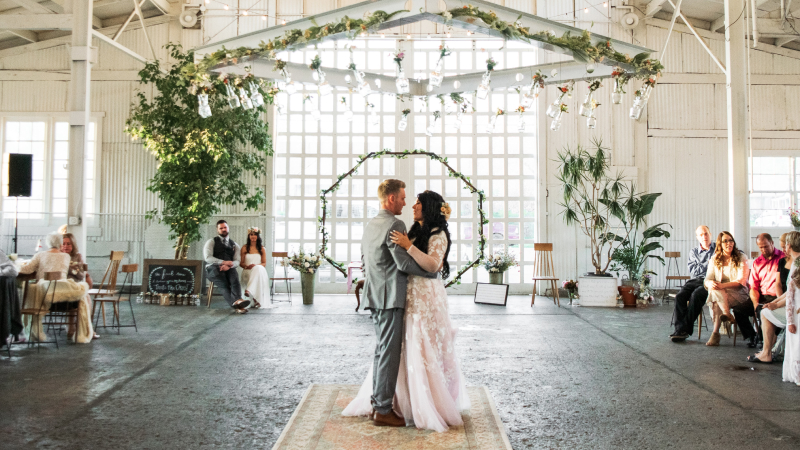How Green Indian Weddings Are Being Reinvented by 2025 Couples
Bybookmybanquet
/ October 24, 2025

The opulent & extravagant big Indian wedding is getting a beautiful and conscious makeover. Enter 2025, and a new wave of couples is threading sustainability into the intricate fabric of their big day. No longer is the shift about losing grandeur, but about reimagining it in a spirit of conscientious purpose and respect for our natural world. Welcome to the era of the sustainable Indian wedding—a festival where joy is balanced by its opposite. Gone are the times when “eco-conscious weddings” were an alien concept.
The Conscious Blueprint: Wedding Planning with Your Mind in the Right Place.
The process of making a sustainable party starts with a change of attitude. Sustainable wedding planning is everything to making conscious decisions step by step. Before, couples were requesting vendors to discuss their environmental policies, choosing venues that match their beliefs, and establishing an environment of greenness early on. This conscious way of wedding planning is the one that makes each aspect, even the invitations and the favors, tell the story of conscious love.Go Paperless: Paperless Invites and Smart Guest Management
An invitation is the initial appearance of a wedding. The thick and multi-layered invitation box is beautifully giving way to classy online wedding invitations in the year 2025. They save many trees, water, and energy, but also, they are extremely convenient. The built-in systems allow couples to handle the RSVP, make beautiful animated e-invitations, and share updates with guests in real time. Seed paper invitations (that can be planted to grow herbs or flowers) or invitations printed on recycled paper using soy-based inks are quickly gaining popularity among those who want to have something physical.The place is Nature is the Cathedral and Solar-powered Celebrations.
The venue determines the impact of the event on the environment. Couples are also getting attracted to: Natural Environment: Natural lawns, historic gardens, and farmhouses will limit the use of light and air conditioning in the daytime. Solar-Powered Wedding Venues: One of the most popular conscious wedding trends of the coming 2025 is using venues that use renewable energy. These areas use solar power to illuminate the mandap and the celebrations and reduce carbon emissions considerably. The green initiatives, such as water harvesting, low consumption of energy using LED lights, and a strong waste sorting system, are gaining popularity in low-cost banquet halls. Whether it is a green wedding or not, the selection of a low-cost banquet hall, the sustainability policy of which can be easily verified, will prove that it is possible to make a wedding both affordable and decent.Eco-Friendly: Where Art and Nature Meet.
The creativity of the Indian weddings is evident in the field of sustainable Indian weddings. It is aimed at abandoning single-use plastic and thermocol in favor of biodegradable, reusable, and upcycled materials.- Sustainable Mandap Design: The mandaps are designed rather than synthetic and are designed using sustainable wood, bamboo, or even recycled doors and windows. They are also decorated with fresh flowers obtained from the local organic farm, which is composted after the event.
- Decorations Reusable Wedding Decorations: It is important to invest in long-lasting decorations. Consider beautiful cloth coverings, potted plants to be taken into the homes of people, terracotta pots, and brass or copper utensils rather than plastic. The other aspect of eco-friendly wedding decor is the renting of items used in some past weddings to make a circular economy.
- Upcycled Wedding Materials: Chandeliers crafted of salvaged glass bangles, centerpieces crafted of old books or fabric scraps—upcycling is a personal touch with an environmental twist and helps to avoid waste. Many strive to have a zero-waste wedding in which all the decorative materials are reused, returned, or composted.
The Fashion: Renting, Reusing, and Revolutionizing
The most important innovation is being made in the bridal trousseau and wedding outfits.- Rent Wedding Dresses: Renting an expensive lehenga or sherwani for the wedding is the new norm. It enables spouses to don designer clothes without the environmental expenditure of a piece of clothing that can be used a single time.
- Heirloom/Vintage: The fact that one is wearing a wedding dress of a parent/grandparent is a very poignant and sustainable decision.
- Vegan Bridal Trousseau: Eco-conscious brides are buying vegan bridal trousseaus, dresses of peace silk (the silkworm is not killed), organic cotton, linen, or khadi, and dresses not made with animal-derived materials, such as leather and wool.
- Lab-Grown Diamonds: The jewelry industry is changing with lab-grown diamonds. They are indistinguishably similar to mined diamonds physically, chemically, and optically, but they are produced with much less environmental cost, and they do not have the same sort of ethical issues that surround the mining of these precious metals.
The Feast: Plant-Forward, Organic, and Local
The Feast also concentrates on organic, local, and plant-forward food, which is the center of Indian hospitality, and sustainable weddings are reinventing the banquet.- Organic & Local: The couples are liaising with caterers to procure organic, seasonal, and locally grown food. This will decrease the carbon footprint of transportation and help local farmers.
- Reducing Food Waste: It can be minimized through the use of RSVP based on exact planning, live counters, cooking fresh in small portions, and collaboration with NGOs to donate untouched, surplus food.
- Vegan/Vegetarian: Although it does not exclude meat, most weddings are now enjoying a greater selection of innovative, exquisite plant-based food, which decreases the overall environmental footprint of the wedding party.
- Eco-friendly Serveware: There is no such thing as disposable plates and cutlery. It is towards biodegradable areca leaf or bamboo plates or even traditional steel thalis, which are washed and reused.
Beauty & Gifting: Conscious Decisions.
The sustainability is applied to the personal care and the guest preferences. Organic Wedding Makeup: Brides are opting to hire makeup artists that use organic bridal makeup and cruelty-free products, which are less harsh on the skin and nature. Considerate Favors: Couples are also giving guests in lieu of plastic items, some edible delights in cloth bags, small potted plants, homemade soaps, or a donation in the name of their guests to a charity.Ripple Effect of a Conscious Celebration.
It is a statement that planning an environmentally friendly wedding in 2025 makes a statement of love in the face of your partner, your community, and the planet. It is shown that the combination of tradition and modernity can be most beautiful and responsible. They are not mere trends but the backbone of the new and conscious mode of celebration that these green ideas of weddings have. With a decision to rent wedding clothes, to use digital wedding invitations, to choose wedding venues with solar power or an affordable banquet hall that has green qualifications, and to use upcycled wedding decorations, couples are not merely making a wedding plan. They are setting a fire, motivating their guests, and showing them that the most memorable events are the ones that leave behind a loving legacy and not a wasteful one.Beauty & Gifting: Mindful Choices
The commitment to sustainability extends to personal care and guest favors.- Organic Bridal Makeup: Brides are choosing makeup artists who use organic bridal makeup and cruelty-free products, which are gentler on the skin and the environment.
- Thoughtful Favors: Instead of plastic trinkets, couples are gifting guests with edible treats in cloth bags, small potted plants, handmade soaps, or donations made to a charity in their guests' names.
The Ripple Effect of a Conscious Celebration
Planning an environmentally friendly wedding in 2025 is a powerful statement of love—for your partner, your community, and the planet. It demonstrates that tradition and modernity can coexist beautifully with responsibility. These eco-conscious wedding ideas are more than just trends; they are the foundation for a new, mindful way of celebrating. By choosing to rent wedding outfits, opt for digital wedding invites, select solar-powered wedding venues or an affordable banquet hall with green credentials, and embrace upcycled wedding materials, couples are not just planning an event. They are igniting a movement, inspiring their guests, and proving that the most memorable celebrations are those that leave behind a legacy of love, not waste.Recent Posts
-
How to Negotiate the Best Price for a Banquet Hall in Delhi
-
Vegetarian Vs Non Vegetarian Menu- How to Decide For Your Guests
-
Top Drinks And Cocktails To Serve At Banquet Hall Functions?
-
Why should you choose a banquet hall in Wazirpur for your special celebration?
-
Budget Banquet Halls V/S Luxurious Banquet Halls, Which One Is Better?
-
Why choose a banquet hall in Punjabi Bagh for your special celebration?
-
How The Banquet Halls in Gurgaon Adapting To Healthy Organic Food Trends?
-
Important Things To Check Before Booking A Banquet Hall In Gurgaon?
-
20+ Stunning Entry Walkways That Will Elevate Your Wedding
-
Wedding Flowers And Decoration Guides For Elegant Weddings In Delhi



